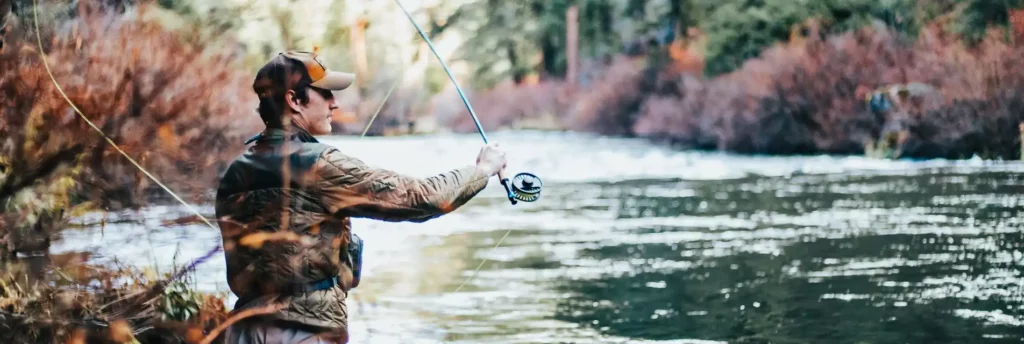Fishing in Delaware offers a unique experience for both residents and tourists. With its rich aquatic biodiversity and scenic fishing spots, Delaware is a haven for anglers. However, to ensure sustainable fishing and protect the state’s aquatic resources, it’s crucial to adhere to the regulations set by the DNREC Division of Fish and Wildlife, and have a proper Fishing License in Delaware. This article provides a comprehensive guide on fishing licenses, regulations, and fees in Delaware for the year 2023.
Types of Fishing Licenses in Delaware
| License Type | Resident | Non-Resident |
|---|---|---|
| General Fishing License | $8.50 | $20.00 |
| 7-day Tourist Fishing | – | $12.50 |
| Boat Fishing License (20 ft or less) | $40.00 (Optional) | $40.00 (Optional) |
| Boat Fishing License (more than 20 ft) | $50.00 (Optional) | $50.00 (Optional) |
Licensing Process in Delaware
To fish in Delaware’s waters, both tidal and non-tidal, anglers must be equipped with the appropriate licenses. The process of obtaining a fishing license in Delaware is straightforward and can be accomplished through various means.
How to Obtain a Fishing License
- Online Purchase: Delaware fishing licenses can be purchased online via Digital DNREC.
- In-Person: Licenses can also be acquired in-person at an authorized license agent or at the licensing desk inside DNREC’s offices.
- Fisherman Information Network (FIN) Number: In addition to the license, anglers will need a Delaware-issued FIN number. If you’ve purchased your fishing license (excluding the Non-Resident Boat Fishing License), your FIN number is automatically generated and displayed on your license. If exempt from licensing requirements, you may need to apply separately for a FIN number through the ePermitting system.
Exemptions
- Residents aged 65 years or older are exempt from licensing, whether fishing from their boat or the shore. However, if there are individuals on the boat who aren’t exempt, they must possess valid licenses.
- Residents owning or living on farms in Delaware with 20 or more acres, and their immediate families residing on the farm, can hunt, fish, and trap on the farm without a license. However, they are still required to obtain an annual free FIN number.
Additional Information
- A general fishing license is necessary for bait fishing with specific gear types.
- Delaware does not have a reciprocity agreement with any other state. Therefore, even if you have a fishing license from another state, you’ll need a Delaware license to fish in Delaware waters.
- If you plan to launch your boat in Delaware to travel to another state for fishing (where you have a valid license), you can do so without a Delaware boat fishing license. However, you cannot fish in Delaware waters during this time.
Fishing Regulations & Requirements in Delaware
Delaware’s fishing regulations are designed to ensure sustainable fishing practices and protect the state’s aquatic resources. The following are some of the key regulations and requirements for fishing in Delaware’s tidal waters:
Tidal Waters Fishing Regulations
| SPECIES | OPEN SEASON | MINIMUM SIZE | DAILY LIMIT |
|---|---|---|---|
| American eel | All year | 9 inches | 25 |
| Atlantic croaker | All year | 8 inches | No Daily Limit |
| Black drum | All year | 16 inches | 3 |
| Black sea bass | May 15 – Sep. 30, Oct. 10 – Dec. 31 | 13 inches | 15 |
| Bluefish | All year | No Size Limit | 3 (private vessel or shore), 5 (charter boat or headboat) |
| Cobia | All year | 37 inches | 1 per angler or 1 per vessel |
| Red drum | All year | 20 – 27 inches may be retained | 5 |
| Striped bass | All year (catch & release only on spawning grounds Apr 1 – May 31) | 28 – 31 inches; 20 – 25 inches only (Jul 1 – Aug 31 in DE Bay, River and tributaries) | 1 (except catch & release only on spawning grounds Apr 1 – May 31) |
| Summer flounder | All year | 16 inches | 4 |
| Tautog | Jan. 1 – May 15, July 1 – Dec. 31 | 16 inches | 4 |
| Weakfish | All year | 13 inches | 1 |
| White perch | All year | 8 inches | No Daily Limit |
Special Restrictions for Shark Fishing
- It is unlawful to fillet a shark prior to landing. A shark may be eviscerated prior to landing, but the head, tail, and fins must remain attached to the carcass.
- It is unlawful to release a shark in a manner that will not ensure the shark’s maximum probability of survival (i.e., no gaffs, no clubbing, careful hook removal, etc.).
- A non-offset, corrodible, non-stainless steel circle hook must be used when fishing for sharks, except when fishing with flies or artificial lures.
- It is unlawful to possess the fins from any shark prior to landing unless they are naturally attached to the body of the shark.
Note
For more detailed regulations, including those for non-tidal waters, anglers are advised to refer to the official Delaware Fishing Regulations Guide.
Renewal of Fishing Licenses in Delaware
Renewing your fishing license in Delaware is a straightforward process, ensuring that anglers can continue to enjoy the state’s abundant fishing opportunities without interruption.
Renewal Process
- Validity Period: A fishing license in Delaware is valid through December 31 for the calendar year in which it was issued.
- Online Renewal: Anglers can renew their fishing licenses online via Digital DNREC. Simply log into your Digital DNREC Account and follow the prompts for license renewal.
- In-Person Renewal: If you prefer, you can also renew your license in-person at DNREC headquarters located at 89 Kings Highway, Dover, or at any of the over 40 licensing agents located throughout the state.
- FIN Number Renewal: Remember, in addition to renewing your fishing license, you’ll also need to renew your Delaware Fisherman Information Network (FIN) number annually. This is a free process and can be done online or in-person.
Note on Exemptions
- Seniors aged 65 years and older, as well as children under the age of 16, are exempt from the fishing license requirement. However, they still need to obtain an annual free FIN number.
- There are special exemptions for members of the armed forces, patients in certain medical facilities, and residents of farms with 20 or more acres. For a detailed list of exemptions and the associated requirements, refer to the official Delaware Fishing Regulations Guide.
Duplicate Licenses
If you happen to lose your fishing license, don’t worry. Duplicate licenses can be printed free of charge by logging into your Digital DNREC Account. If you need further assistance or information regarding duplicate licenses, you can contact the Recreational Licensing Office at (302) 739-9918 or email [email protected].
Additional Information for Anglers in Delaware
Delaware, with its rich aquatic ecosystems, offers a plethora of fishing opportunities. Here are some additional insights and tips for anglers:

Best Fishing Spots in Delaware
- Delaware Bay: Renowned for its striped bass, flounder, and bluefish.
- Rehoboth Bay: Ideal for catching weakfish and summer flounder.
- Indian River Inlet: A hotspot for bluefish, striped bass, and tautog.
- Lums Pond State Park: Freshwater fishing for largemouth bass, catfish, and bluegill.
Tips for Anglers
- Seasonal Fishing: Understand the fishing seasons in Delaware. For instance, spring is excellent for striped bass, while summer is ideal for flounder.
- Safety First: Always check the weather forecast before heading out, especially if you plan to fish in the open waters of Delaware Bay or the Atlantic Ocean.
- Local Bait Shops: Visit local bait shops for insights on what’s biting and the best bait to use.
- Catch and Release: If you’re not sure about the size or species of the fish, it’s best to practice catch and release to ensure you’re not unintentionally breaking any regulations.
- Stay Updated: Regulations can change. Always refer to the official Delaware Fishing Regulations Guide for the most up-to-date information.
Conclusion
Fishing in Delaware is more than just a pastime; it’s an experience. With its diverse aquatic life and scenic spots, the state offers something for every angler. However, it’s essential to be informed and adhere to the regulations to ensure sustainable fishing for future generations.
FAQ (Frequently Asked Questions)
1. Do I need a separate license for freshwater and saltwater fishing in Delaware?
Answer: No, a general fishing license in Delaware covers both freshwater and saltwater fishing. However, always ensure you’re adhering to the specific regulations for the area you’re fishing in.
2. I’m visiting Delaware for a week. Can I get a short-term fishing license?
Answer: Yes, Delaware offers a 7-day Tourist Fishing license for non-residents, which costs $12.50.
3. Are there any exemptions for senior citizens regarding fishing licenses?
Answer: Yes, Delaware residents aged 65 years or older are exempt from the fishing license requirement. However, they still need to obtain an annual free FIN number.
4. Can I transfer my fishing license to someone else?
Answer: No, fishing licenses in Delaware are non-transferable.
5. I lost my fishing license. How can I get a replacement?
Answer: Duplicate licenses can be printed free of charge by logging into your Digital DNREC Account. For further assistance, contact the Recreational Licensing Office.
6. How often do I need to renew my FIN number?
Answer: The Delaware Fisherman Information Network (FIN) number needs to be renewed annually. It’s a free process and can be done online or in-person.
7. Are there any penalties for fishing without a valid license in Delaware?
Answer: Yes, fishing without a valid license can result in fines and penalties. It’s essential to ensure your license is up-to-date before fishing.
8. Can I fish on private property without a fishing license?
Answer: While fishing on private property might not require a license, it’s always best to check with local regulations and obtain permission from the property owner.

